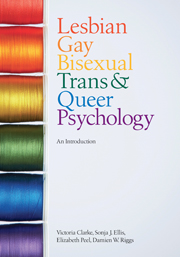Book contents
- Frontmatter
- Contents
- List of boxes
- Introduction: how to read and use this book
- Section I History, contexts and debates in LGBTQ psychology
- Section II Understanding social marginalisation in LGBTQ lives
- 4 Diversity
- 5 Prejudice and discrimination
- 6 Health
- Section III LGBTQ experiences across the lifespan
- Conclusion
- Glossary
- Additional resources
- References
- Index
- References
5 - Prejudice and discrimination
from Section II - Understanding social marginalisation in LGBTQ lives
- Frontmatter
- Contents
- List of boxes
- Introduction: how to read and use this book
- Section I History, contexts and debates in LGBTQ psychology
- Section II Understanding social marginalisation in LGBTQ lives
- 4 Diversity
- 5 Prejudice and discrimination
- 6 Health
- Section III LGBTQ experiences across the lifespan
- Conclusion
- Glossary
- Additional resources
- References
- Index
- References
Summary
Overview
• Sexuality and gender identity prejudice in context
• Sexuality and gender identity prejudice as anti-LGBTQ attitudes and behaviours
• Sexuality and gender identity prejudice as social marginalisation
Sexuality and gender identity prejudice in context
Since 2000, both in the UK and internationally, there has been unprecedented legal change outlawing discrimination on grounds of sexuality, including: lifting the ban on homosexuals in the military in some countries; the equalisation of the age of consent for sex between men in the UK; the repeal of Section 28 of the Local Government Act in the UK; the extension of adoption rights to same-sex couples in the USA and the UK; protection from discrimination in the workplace in the UK; access to civil partnership and marriage in some countries (see Chapter 8 for a detailed list); and most recently, protection from discrimination in the provision of goods and services in the UK.
Similarly, there have been a number of positive changes in relation to gender identity. For example, in the UK, the 1999 Sex Discrimination (Gender Reassignment) Regulations – superseded by the Equality Act 2006 – outlawed discrimination against trans people in employment. Similarly, the Gender Recognition Act (2004) enabled trans people to have their acquired gender recognised; and in 2008 an Amendment to the Sex Discrimination Regulations made it unlawful to discriminate against trans people in the provision of goods, services, facilities and premises. Other countries vary in the degree to which trans issues are explicitly addressed in legislation.
- Type
- Chapter
- Information
- Lesbian, Gay, Bisexual, Trans and Queer PsychologyAn Introduction, pp. 103 - 124Publisher: Cambridge University PressPrint publication year: 2010



